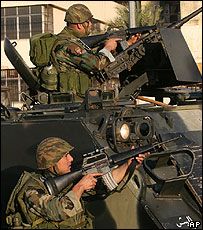Wearing tatty green Israeli army webbing over his black leather jacket, Walid shoulders an M16 rifle and squints down the barrel.
Outside Abu Rida’s door potential customers and colleagues inspect his latest acquisitions. Apart from weapons and ammunition, he is selling an Israeli army flak jacket and military webbing, booty seized by Hezbollah fighters during the summer 2006 war
The majority of weapons come from a pool of arms inside Lebanon; relatively little is smuggled from abroad. Palestinian refugee camps, hosting multiple armed groups and lying outside the jurisdiction of the Lebanese state, also provide a good source of weapons.
Abu Rida said that the weapons he sold were for individual protection and consisted of nothing larger than heavy machineguns and rocket-propelled grenades. “You don’t need mortars for street fighting,” he said with a chuckle. Sales have peaked and most of his customers now visit him to stock up on ammunition. “Everyone’s armed themselves by now,” he said.
The surge in arms sales has fuelled accusations by rival political factions that opponents are building militias in anticipation of war. Anti-Syrian politicians have accused Hezbollah of arming and training its political allies in the opposition at camps in the Bekaa Valley, a charge that the Shia group denies. It also denies that it is providing weapons to other Lebanese factions. Anti Government has accused pro-government forces of Arming themselves.
Analysts say that, despite the crisis, Lebanese leaders have no wish to descend once more into civil conflict and have attempted to dampen tensions on the street in recent months.
 Nicholas Blanford in Beirut ,
Nicholas Blanford in Beirut , 


